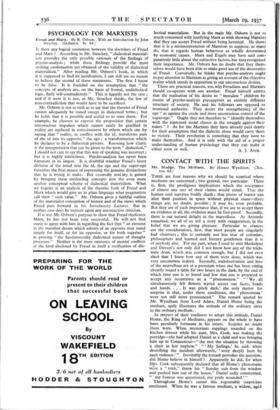PSYCHOLOGY FOR MARXISTS
Freud and Marx. By R. Osborn. With an Introduction by John Strachey. (Gollancz. 8s. 6d.) Is there any logical connexion between the doctrines of Freud and Marx ? According to Mr. Strachey, "dialectical material- ism provides the only possible rationale of the findings of psycho-analysis ; while these findings provide the most striking confirmation yet obtained of the validity of dialectical materialism." After reading Mr. Osbom's book, in which it is supposed to find its justification, I can still see no reason to believe the second of these statements. The first I know to be false. It is founded on the assumption that "the concepts of analysis are, on the basis of formal, undialectical logic, flatly self-contradictory." This is happily not the case ; and if it were it is not, as Mr. Strachey thinks, the law of non-contradiction that would have to be sacrificed.
Mr. Osborn is not so rash as to say that the theories of Freud cannot adequately be stated except in dialectical terms ; but he holds that it is possible and useful so to state them. For example, he chooses to express the proposition that certain unconscious impulses which cannot easily be gratified in reality are replaced in consciousness by others which can by
saying that "reality, in conflict with the id, transforms part of the id into its opposite," the ego ; a transformation which he declares to be a dialectical process. Knowing how elastic is the interpretation that can be given to the term ".dialectical," I should not care to say that this way of speaking was incorrect ; but it is highly infelicitous. Psycho-analysis has never been fortunate in its jargon. It is doubtful whether Freud's latest division of the mind into the id, the ego and the super-ego furnishes the best means of expressing the genuine distinctions that he is trying to make. But essuredly notking is gained by bringing these misleading concepts into the even more unclear conceptual scheme of dialectical materialism. What we require is an analysis of the theories both of Freud and Marx which would give us in plain language what pragmatists call their "cash value." Mr. Osborn gives a faithful outline of the materialist conception of history and-of the Views which Freud puts forward in his Introductory Lectures. But in neither case does he venture upon any constructive criticism.
' If it was Mr. Osborn's purpose to show that Freud vindicates Marx, he has not been very, successful. He will not find many to agree with him in regarding the fact that "an element in the manifest dream which admits of an opposite may stand simply for itself, or for its opposite, or for both together" as proving "the fundamentally dialectical nature of thought processes." Neither is the mere existence of mental conflicts of the kind disclosed by Freud in itself a verification of dia-
•
lectical materialism. But in. the main Mr. Osborn is not so much concerned with justifying Marx as with showing-Maixists that they can accept Freud without being heretical. He shows that it is a misinterpretation of Marxism to iuppose, as many do, that it regards human behaviour as wholly determined by economic causes. Marx and Engels may have said com- paratively little about the subjective factors, but they recognised their importance. Mr. Osborn has no doubt that they them- selves would have been able to make good use of the discoveries of Freud. Conversely, he thinks that psycho-analysts ought to pay attention to Marxism as giving an account of the objective reality which stands in opposition to our unconscious desires.
There are practical reasons, too, why Freudians and Marxists should co-operate with one another. Freud himself admits that the realisation of his desire .to ". inoculate " children by means of psycho-analysis presupposes an entirely different structure of society. He and his followers • are opposea to irrational authority. They desire the strengthening oe the ego "as against the crude and more unconscious control ot the super-ego." Ought they not therefore to "identify themselves with the repressed social classes in the struggle against•their rulers " ? As for the Marxists they have already paid dearly for -their assumption that the dialectic alone would carry them to victory. Their revolution is something that they have to make themselves. And it is only with the aid of a proper understanding of human Psychology that they can make it




































































 Previous page
Previous page